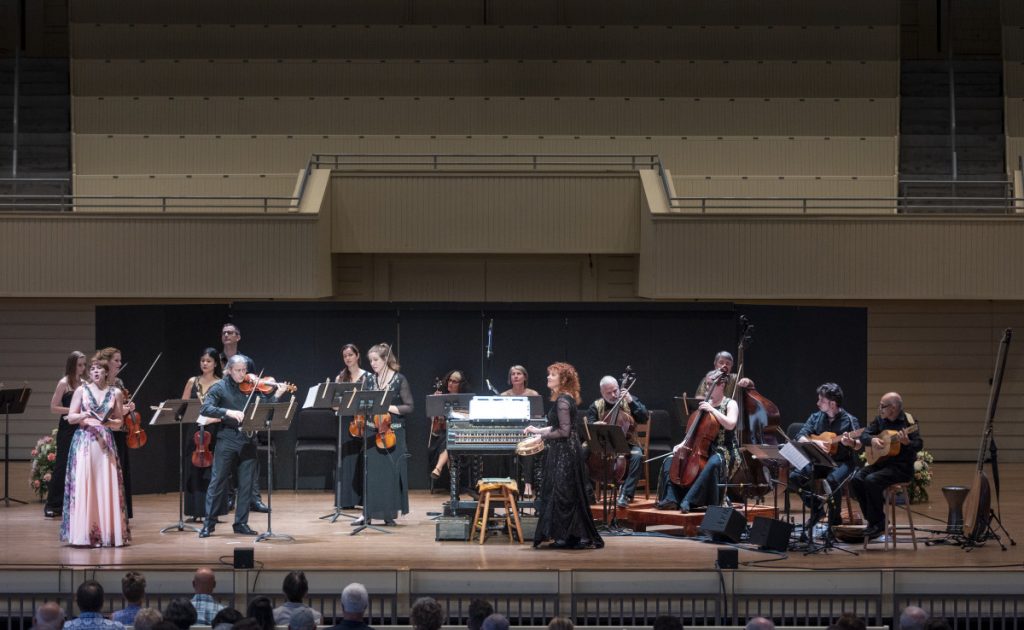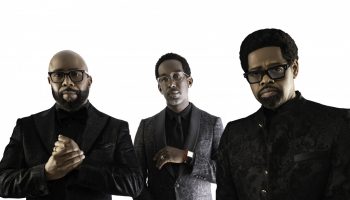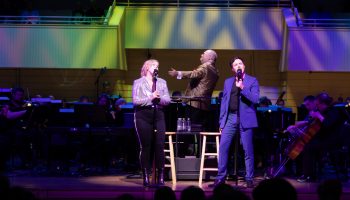ZACHARY LEWIS – GUEST CRITIC

Emotions ran uncommonly high Tuesday night at the Amphitheater. With and through Apollo’s Fire, the Cleveland-based baroque orchestra, a sizable crowd sincerely felt in music the joy, agony and sheer beauty of romance.
“Love in Venice,” as the program was called, escorted listeners on a vivid, almost visceral trip to 17th- and 18th-century Italy, where cultures collided, music flourished and the likes of Monteverdi, Vivaldi and Strozzi were household names, at least among the well-heeled.
Apollo’s Fire doesn’t just play, you see. It inhabits the music. In the hands of this award-winning chamber orchestra, and especially in “Love in Venice,” scores become veritable pieces of theater, animated scenes replete with drama impossible to absorb passively. When these players utter their creative tagline, “Passion. Period,” they mean it.
The quick but densely packed evening was divided into three sections, each depicting one stage of a relationship. “Party at the Palazzo” imagined a meeting and the festive bloom of love; “Love is Difficult” depicted a more mature, complex phase; and “Summer Madness” conjured a rough conclusion in storms and arguments.
By the end, the house was on its feet, clamoring for more, and founding artistic director Jeannette Sorrell was wandering about the stage, delightedly tapping a tambourine instead of her harpsichord in time with the Turkish folk song the players offered by way of an encore.
The lion’s share of the evening was devoted, as well it should have been, to Vivaldi. Apollo’s Fire, back at Chautauqua for a third visit, made a bold entrance with his feisty “Ciaccona” (“Chaconne”) and went out stomping with “La Folia,” a dance that rose from quiet elegance to a frenzied peak, the Baroque equivalent of a rave, with violinist Emi Tanabe brilliantly leading an explosive charge.
In between came a turbulent account of “Summer” from “The Four Seasons,” with its evocations of cloudbursts and dynamic solo role handled with verve by violinist Susanna Perry Gilmore. The same artist also distinguished herself alongside rotating concertmaster Olivier Brault in Vivaldi’s Concerto in A Minor for Two Violins. Together, the two were wonders of expression, and the support they received from Sorrell and the orchestra was as intimate and seamless as could be. (Happily, a distant, repeating siren was no match for either of them, or Apollo’s Fire.)
Monteverdi was the other giant on the program, and through him emerged another star. Twice, soprano Erica Schuller bewitched the Amphitheater with his music, conjuring with dulcet tone and poignant, shapely phrasing the onset of spring (“Zefiro Torna”) and pure regret (“Alas, I Tumble Down”). In a similar vein, and no easier on hearts, was Schuller’s performance of “What Can You Do?,” an aria by the great Barbara Strozzi.
The Amphitheater sees all kinds of music. Every night, practically, it’s something different. But Apollo’s Fire, as a whole new batch of Chautauquans now know, is something else entirely. Even within the realm of classical and period music, it stands apart. Not until Apollo’s Fire returns is this stage likely to host anything quite like “Love in Venice” again.
Zachary Lewis is a freelance journalist in Cleveland. He is the former classical music and dance critic of The Plain Dealer.




